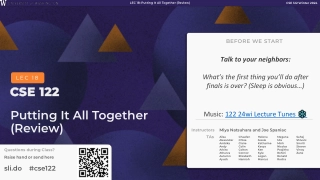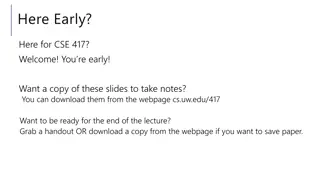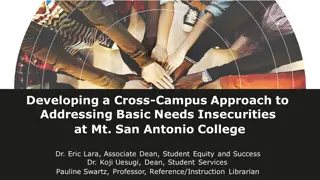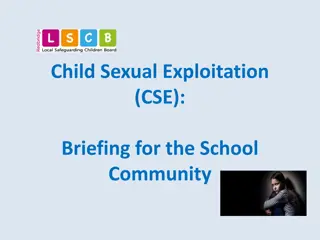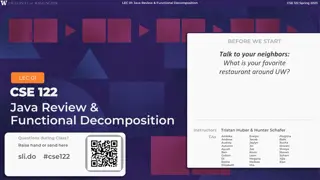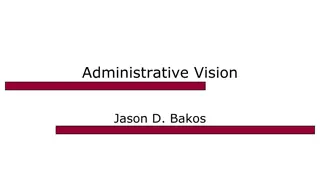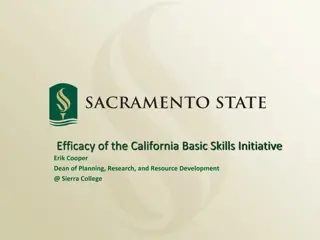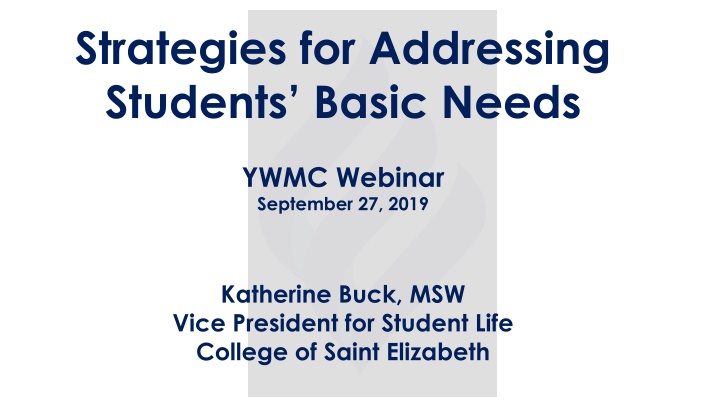
Strategies for Addressing Students' Basic Needs at College of Saint Elizabeth
Explore strategies and initiatives at the College of Saint Elizabeth aimed at addressing students' basic needs such as mental health, wellness, and insecurity. Learn about counseling services, student support programs, and the institution's commitment to serving a diverse student population. Discover how the college fosters a supportive environment for student success.
Download Presentation

Please find below an Image/Link to download the presentation.
The content on the website is provided AS IS for your information and personal use only. It may not be sold, licensed, or shared on other websites without obtaining consent from the author. If you encounter any issues during the download, it is possible that the publisher has removed the file from their server.
You are allowed to download the files provided on this website for personal or commercial use, subject to the condition that they are used lawfully. All files are the property of their respective owners.
The content on the website is provided AS IS for your information and personal use only. It may not be sold, licensed, or shared on other websites without obtaining consent from the author.
E N D
Presentation Transcript
Strategies for Addressing Students Basic Needs YWMC Webinar September 27, 2019 DATA DRIVEN Power Point Presentation Katherine Buck, MSW Vice President for Student Life College of Saint Elizabeth
College of Saint Elizabeth Morristown, New Jersey Mission The mission of the College of Saint Elizabeth, sponsored by the Sisters of Charity of Saint Elizabeth, is to be a community of learning in the Catholic liberal arts tradition for students of diverse ages, backgrounds, and cultures. Traditional Undergraduates: 44% B/AA 30% Hispanic Through the vision and values of Elizabeth Ann Seton, Vincent de Paul and Louise de Marillac and rooted in Gospel values and in Catholic Social Teaching, the College of Saint Elizabeth affirms its solidarity with the poor and its commitment in service to the community. 16% White 71% Pell Eligible 46% First Gen Students Originally founded as a women s college in 1899, CSE became coed in 2016 and currently serves 1299 students. CSE is a minority and Hispanic serving institution.
College of Saint Elizabeth Points of Pride Named to U.S. News & World Report's new list of "Top Performers for Social Mobility" Recipient of the Lee Noel-Randi Levitz Retention Excellence Award for its achievements in supporting student success and completion through FASTRAK, a literacy-intensive summer bridge program. U.S. News & World Report "Best Ethnic Diversity", "Regional Universities in the North" and "Best Online Graduate Criminal Justice Programs. Money magazine's "Best Colleges in 2018" list. Washington Monthly named CSE among the top 100 schools on both "Best Master's Universities" (#98 out of 695 nationwide) and "Best Bang for the Buck North" (#38 out of 400 in Northeast region). 2019-2020 Colleges of Distinction, including in categories: Catholic Colleges and Universities, Education, Nursing and Career Development. TheBestSchools.org ranking of Best Online Master of Nutrition Degree Programs. Student to faculty undergraduate ratio 13:1; graduate 11:1. 2017 National Science Foundation S-STEM (Scholarships in Science, Technology, Engineering and Mathematics) grant for undergraduate biology programs.
Counseling Services: Staffed with one licensed clinician 10 Months/Year Counseling Services: Staffed with one licensed clinician 10 Months/Year Added two Psy.D. interns. Embedded Psy.D. interns into each section of Element I: First Year General Ed program (AKA First Year Seminar). BASIC NEEDS INSECURITY Provided faculty training on recognizing trauma, implemented 5th week assessments in El. I, implemented intrusive & transitional advising model and developed robust online reporting system. Mental Health & Wellness All students on academic probation must: choose a class with the Student Retention Coordinator (SRC), arrange individual weekly sessions with the SRC or opt for 6 counseling sessions. Implemented Let s Talk tables at various times/places on campus to de-stigmatize counseling. Established partnership with local IOP services for students beyond our scope of practice, but who don t need inpatient treatment. Services delivered all year - on campus or off-site, transportation provided by the IOP .
Health Services: Staffed with one physician, reduced Health Services: Staffed with one physician, reduced summer hours. All full summer hours. All full- -time students are billed for CSE time students are billed for CSE insurance but can waive out of plan if covered privately. insurance but can waive out of plan if covered privately. BASIC NEEDS INSECURITY Basic medications are provided in Health Services at cost and any charges placed on student s bill to ensure timely provision and ability to pay slowly over time. Mental Health & Wellness Established partnership with local pharmacy to deliver meds to the residence hall (no delivery fee). Prescriptions charged to student insurance. Established emergency fund for dental assistance & eye care.
Established Food Pantry on Campus which also provides toiletries to any student patron, no questions asked. Foods & Nutrition Department Received Campus Kitchen Grant to obtain donated food from local establishments to be repurposed into frozen meals for campus and local non-profit organizations. BASIC NEEDS INSECURITY As of May 13, 2019, approximately 5,680 pounds of food was recovered. Approximately 200 pounds were not salvageable, approximately 100 pounds are in inventory, the remaining was distributed to: Nutrition & Hygiene Aftercare programs Group homes Local food pantries (including CSE!) Senior housing sites Inner city outreach organizations o o o o o For families, assist the student with requesting help from neighborhood churches that will provide gift cards to the closest grocery store or information on other local resources. Established an on-campus nutrition counseling center free of charge for students and staff.
The Experiential Learning Centers (ELC) professional mentoring program: BASIC NEEDS INSECURITY Maintains a professional clothing closet to equip students for the interview/job. Nutrition & Hygiene Partners with Suits for Success, Dress for Success and local consignment shops to assist with securing professional clothing for students (transportation provided by CSE). ELC also partners with Enterprise Car rentals for internships, jobs etc., which has led to the creation of an annual fashion show emceed by our Campus Representative. Models demonstrate professional, business casual, and casual dress and hygiene. Student models keep the clothing! .
Provided extended break housing to homeless or housing insecure students in the residence halls on a case-by-case basis. BASIC NEEDS INSECURITY When the halls are completely closed (one week at Christmas), we have partnered with a local Baptist Church to use their hospitality house. Housing & Shelter Kitchen stocked with breakfast and lunch items daily Church families bring in hot meal each evening. Students adopted by a family for Christmas day o Dinner o Gifts No supervision in house Up-to-date list of shelters provided as a last option.
BASIC NEEDS INSECURITY Established the Presidential Impact Fund to help students close the gap in financial aid: Need must be $5000 or less One Time grant (not loan) Finances
BASIC NEEDS INSECURITY Roots & Wings FLY program Roots & Wings FLY program New Jersey Agency that: Provides young adults who age out of the NJ foster care system with safe housing, educational support, case management, counseling, and life skills (financial mgmt., career, social/emotional wellness. Community Partnerships Services are provided on campus in small, weekly group format to help students live independently upon graduation.
BASIC NEEDS INSECURITY Degree Up Program : Degree Up Program : Funded by NORWESCAP , staffed by students and Vista or AmeriCorps volunteers to connect students/families with local and/or on campus resources. Future Community Partnerships HOPEFULLY MORE TO COME! Contact Info.: Kbuck@cse.edu (973) 290-4203


